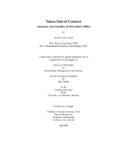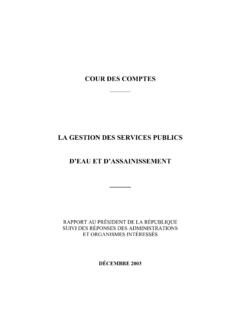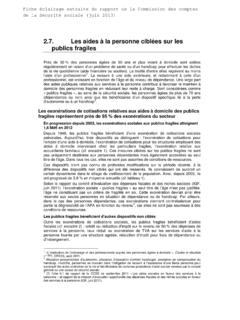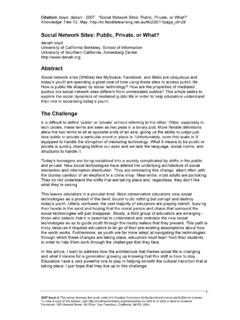Transcription of WORLD PUBLICS WELCOME GLOBAL TRADE – BUT …
1 1615 L Street, , Suite 700 Washington, 20036 Tel (202) 419-4350 Fax (202) 419-4399 FOR RELEASE: THURSDAY, OCTOBER 4, 2007, 12:00 PM EDT WORLD PUBLICS WELCOME GLOBAL TRADE BUT NOT IMMIGRATION 47-Nation Pew GLOBAL Attitudes Survey FOR FURTHER INFORMATION CONTACT: Andrew Kohut, President Richard Wike, Senior Researcher Juliana Menasce Horowitz, Research Associate (202) 419-4350 October 4, 2007 TABLE OF CONTENTS Page Overview: WORLD PUBLICS WELCOME GLOBAL TRADE But Not Immigration ..1 About the Project ..9 WORLD Map and Country List ..10 Roadmap to the Report ..12 Chapter 1: Views of GLOBAL Change ..13 Chapter 2: Views of Immigration ..25 Chapter 3: Views of Religion and Morality ..33 Chapter 4: Values and American Exceptionalism ..41 Chapter 5: Views on Gender Chapter 6: Views on Democracy ..55 Chapter 7: Where People Get Their News.
2 67 Chapter 8: Computers and Technology ..73 Survey Methods ..79 Survey Copyright 2007 Pew Research Center WORLD PUBLICS WELCOME GLOBAL TRADE BUT NOT IMMIGRATION he PUBLICS of the WORLD broadly embrace key tenets of economic globalization but fear the disruptions and downsides of participating in the GLOBAL economy. In rich countries as well as poor ones, most people endorse free TRADE , multinational corporations and free markets. However, the latest Pew GLOBAL Attitudes survey of more than 45,000 people finds they are concerned about inequality, threats to their culture, threats to the environment and threats posed by immigration. Together, these results reveal an evolving WORLD view on globalization that is nuanced, ambivalent, and sometimes inherently contradictory. There are signs that enthusiasm for economic globalization is waning in the West Americans and Western Europeans are less supportive of international TRADE and multinational companies than they were five years ago.
3 In contrast, there is near universal approval of GLOBAL TRADE among the PUBLICS of rising Asian economic powers China and India. The survey also finds that globalization is only one of several wide-ranging social and economic forces that are rapidly reshaping the WORLD . Strong majorities in developing countries endorse core democratic values, but people are less likely to say their countries are ensuring free speech, delivering honest elections or providing fair trials to all. Conflicting views on the relationship between religion and morality sharply divide the WORLD . But on gender issues, the survey finds that a GLOBAL consensus has emerged on the importance of education for both girls and boys, while most people outside the Muslim WORLD also say that women and men make equally good political leaders. T Support for Key Features of Economic Globalization Positive views of.
4 Foreign Free TRADE companies* markets % % % 59 45 70 Canada 82 48 71 Argentina 68 39 43 Bolivia 80 49 53 Brazil 72 70 65 Chile 88 63 60 Mexico 77 65 55 Peru 81 61 47 Venezuela 79 74 72 Britain 78 49 72 France 78 44 56 Germany 85 47 65 Italy 68 38 73 Spain 82 56 67 Sweden 85 53 71 Bulgaria 88 52 42 Czech Rep.
5 80 63 59 Poland 77 60 68 Russia 82 46 53 Slovakia 83 72 53 Ukraine 91 47 66 Turkey 73 -- 60 Egypt 61 68 50 Jordan 72 59 47 Kuwait 91 68 65 Lebanon 81 64 74 Morocco 70 72 66 Palest. ter. 69 43 66 Israel 90 69 72 Pakistan 82 39 60 Bangladesh 90 75 81 Indonesia 71 62 45 Malaysia 91 80 71 China 91 64 75 India 89 73 76 Japan 72 54 49 S.
6 Korea 86 54 72 Ethiopia 86 70 47 Ghana 89 89 75 Ivory Coast 94 80 80 Kenya 93 82 78 Mali 86 79 76 Nigeria 85 82 79 Senegal 95 87 63 S. Africa 87 77 74 Tanzania 82 45 61 Uganda 81 73 67 % saying TRADE is good for their country; foreign companies are having a positive impact on their country; and people are better off in free market economies. *not asked in Turkey. 2 Costs and Benefits of Globalization Overwhelmingly, the surveyed PUBLICS see the benefits of increasing GLOBAL commerce and free market economies. In all 47 nations included in the survey, large majorities believe that international TRADE is benefiting their countries.
7 For the most part, the multinational corporations that dominate GLOBAL commerce receive favorable ratings. Nonetheless, since 2002 enthusiasm for TRADE has declined significantly in the United States, Italy, France and Britain, and views of multinationals are less positive in Western countries where economic growth has been relatively modest in recent years. In most countries, majorities believe that people are better off under capitalism, even if it means that some may be rich and others poor. Support for free markets has increased notably over the past five years in Latin American and Eastern European nations, where increased satisfaction with income and perceptions of personal progress are linked to higher per capita incomes. But there are widely shared concerns about the free flow of people, ideas and resources that globalization entails.
8 In nearly every country surveyed, people worry about losing their traditional culture and national identities, and they feel their way of life needs protection against foreign influences. Importantly, the poll finds widespread concerns about immigration. Moreover, there is a strong link between immigration fears and concerns about threats to a country s culture and traditions. Those who worry the most about immigration also tend to see the greatest need for protecting traditional ways of life against foreign influences. 2437314043181611233433322625222223272210 1862370482398151913399111524282915353153 2727233933756277747372716851877775686675 7264635353777472705247259489848382757471 675842538677848989677070 United StatesCanadaVenezuelaChileBoliviaBrazilM exicoArgentinaPeruItalySpainBritainFranc eGermanySwedenCzec h KoreaIvory CoastSouth AfricaTanzaniaSenegalKenyaMaliEthiopiaNi geriaGhanaUgandaDisagreeAgreeWe Should Further Restrict and Control Immigration 3 Immigration Fears In both affluent countries in the West and in the developing WORLD , people are concerned about immigration.
9 Large majorities in nearly every country surveyed express the view that there should be greater restriction of immigration and tighter control of their country s borders. Although Western PUBLICS remain concerned about immigration, they generally are less likely to back tighter controls today than they were five years ago, despite heated controversies over this issue in both Europe and the United States over the last few years. In Italy, however, support for greater restrictions has increased 87% now support more controls on immigration, up seven points from 2002. Concerns about immigration have increased in other countries as well, perhaps most notably in Jordan, where an influx of Iraqi refugees has raised the salience of this issue 70% of Jordanians back tighter immigration controls, up from 48% five years ago. Religion and Social Issues GLOBAL PUBLICS are sharply divided over the relationship between religion and morality.
10 In much of Africa, Asia, and the Middle East, there is a strong consensus that belief in God is necessary for morality and good values. Throughout much of Europe, however, majorities think morality is achievable without faith. Meanwhile, opinions are more mixed in the Americas, including in the United States, where 57% say that one must believe in God to have good values and be moral, while 41% disagree. The survey finds a strong relationship between a country s religiosity and its economic status. In poorer nations, religion remains central to the lives of individuals, while secular perspectives are more Wealth and ,00020,00030,00040,00050,000 Per Capita GDP (Standardized)Score on religiosity EuropeEast EuropeKuwait 4common in richer This relationship generally is consistent across regions and countries, although there are some exceptions, including most notably the United States, which is a much more religious country than its level of prosperity would indicate.






